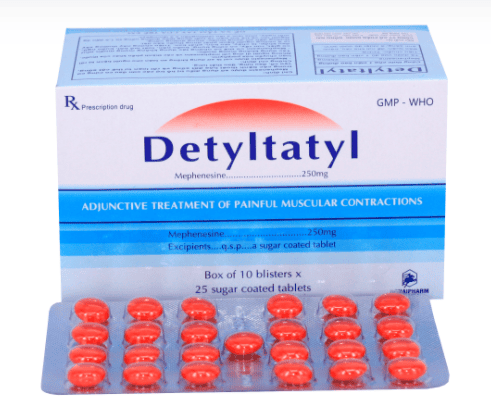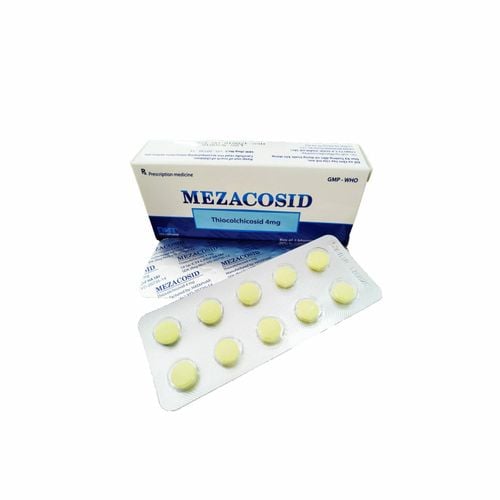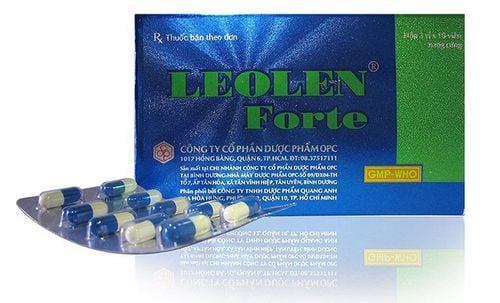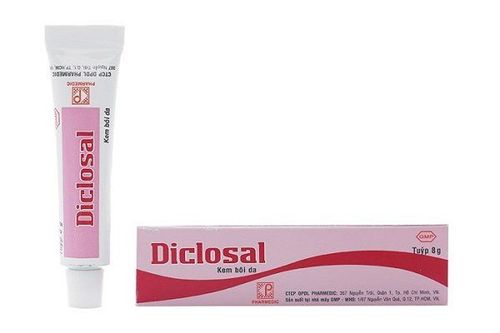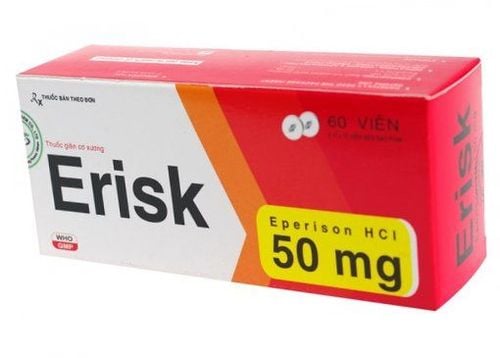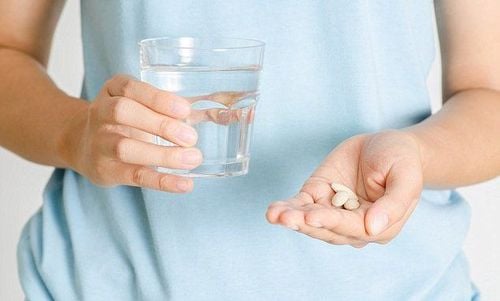This is an automatically translated article.
Chlorphenesin is indicated for symptoms of painful muscle spasms caused by disorders in the musculoskeletal system: Inflammation - pain in the spine, low back pain, spinal degeneration or spinal balance disorders. To better understand the use of Chlorphenesin, let's learn more in the article below.1. What is Chlorphenesin?
Chlorphenesin is a phenol ether used to treat painful muscle conditions by relaxing the muscles. The drug works by blocking nerve impulses that carry pain sensations from being sent to the brain. Chlorphenesin's mechanism of action has not been clearly defined and its effects are mainly measured by subjective reactions. Сhlorphenesin acts in the central nervous system (CNS) rather than directly on skeletal muscle. In addition, the drug also has antifungal and some antibacterial properties.Approximately 85% of a dose is eliminated within 24 hours as glucuronide metabolites, with a half-life of 3 to 5 hours, and most of this process occurs in the liver.
2. Uses of the drug Chlorphenesin
2.1. Uses of Chlorphenesin
Chlorphenesin is used together with rest and physical therapy in the treatment of injuries and other painful muscle conditions. It has also been studied for use in tic douloureux, a neurological disorder characterized by severe facial pain. Chlorphenesin has also been studied as a modulator of histamine release.2.2. Indications for chlorphenesin
Used to treat musculoskeletal-related diseases such as: lumbar spine pain, spondylolisthesis, Huntington's chorea, disc herniation, shoulder-arm syndrome and spondylitis.2.3. Contraindications of Chlorphenesin
People with a history of hypersensitivity to one of the ingredients of the drug. Patients with liver dysfunction. Infants or children.2.4. Dosage of Chlorphenesin
For adults: 2 tablets/time x 3 times/day. Dosage may be increased or decreased depending on age and severity of symptoms.3. How to use Chlorphenesin effectively
Chlorphenesin carbamate is used as directed by your doctor. Take the time to read all the information your doctor gives you. Follow all instructions with strict compliance.The medicine can be taken with or without food. If you take the medicine and experience stomach upset, you can take it with food while eating.
3.1. What do you need to know? Or what to do when using drugs?
Tell all of your healthcare providers that you take chlorphenesin carbamate. This includes your doctor, nurse, pharmacist and dentist. Avoid driving and doing other jobs or actions that keep you awake until you see how chlorphenesin carbamate affects you. Talk to your doctor before you drink alcohol or use other drugs and natural products that slow down your decision-making. Have a blood test if you are using chlorphenesin carbamate for a long time. If you are 65 years of age or older, use chlorphenesin carbamate carefully because more side effects may be experienced. If you are planning to become pregnant you should talk to your doctor to discuss the benefits and risks of using chlorphenesin carbamate during pregnancy. In addition, you also need to take the necessary tests to know that you are not pregnant in the time before using the drug.3.2. What should I do if I miss a dose?
If you take chlorphenesin carbamate on a regular basis, if you miss a dose take it as soon as you remember. If it is almost time for the next dose, skip the missed dose and take a new dose without taking 2 doses at the same time or increasing the dose. Sometimes chlorphenesin carbamate is used as needed. Do not take it more often than prescribed by your doctor.3.3. Precautions while using the drug
It is possible for many people to experience no side effects or very rarely, but some cases are very severe or can lead to death. Inform your doctor as soon as you have any of the following danger signs:Manifestations of an allergic reaction such as: Rash; hives; itchy; red, swollen, blistering, or peeling skin with or without fever; wheeze; chest or throat tightness; trouble breathing/swallowing or talking; or swelling of the mouth, face, lips, tongue, or throat; or unusual hoarseness Stevens-Johnson syndrome/toxic epidermal necrolysis also known as bad skin syndrome may occur. The consequences of this reaction can be irreversible or even lead to death. Get medical help right away if you have signs of red, swollen, blistering or peeling skin (may be accompanied by a fever); red or irritated eyes; or sores in your oral cavity and upper respiratory tract or eyes. Like other medicines, this medicine can also cause side effects. However, most people have no side effects or only mild side effects. Contact the nearest medical facility immediately if you have any of the following persistent symptoms:
Drowsiness. Dizzy . Stomach pain or heartburn. Stomach upset. Don't feel hungry. These are not all possible side effects. If you have any questions about side effects, contact your doctor right away. You should immediately contact a doctor or professional for advice about side effects.
Seek medical help as soon as you are in a situation where your symptoms do not improve or even get worse. Do not share this medication with others (split doses) and also do not take this medication from another person's source. The medicine may come with a drug fact sheet for your reference. Check with your pharmacist. If you have any questions about chlorphenesin carbamate, please talk with your doctor, nurse, pharmacist or other healthcare provider. If you think an overdose has occurred, call your poison control center or get medical attention right away. Be prepared to provide information about the medication used, the dose, what side effects occurred and when it happened.
3.4. Drug interactions
There are a total of 280 drugs known to interact with Chlorphenesin, classified as 26 major interactions, 254 moderate interactions, and 0 minor interactions. Which may interact with alcohol. Alcohol can increase the side effects of Chlorphenesin on the nervous system such as dizziness, drowsiness, and difficulty concentrating. The ability to think and judge may be affected in some people. You should avoid or limit alcohol use while being treated with chlorphenesin. Do not take more than the recommended dose of Chlorphenesin and avoid activities that require mental alertness such as driving or operating dangerous machinery until you are fully awake and feel the effects of the medicine. . Make it a habit to contact your doctor or pharmacist if you have any questions during use.3.5. Storing or handling medications when not using Chlorphenesin
Store at room temperature. Keep in dry places. Do not store in the bathroom. Keep medicine in your home medicine cabinet or somewhere safe. Medicines should be kept out of reach of children and pets. Unused or expired medications must be disposed of properly to ensure safety. Do not arbitrarily dispose of medicine into the surrounding environment without considering the safety of your family and those around you. You can also ask your pharmacist for advice on the best way to dispose of the medicine. Be on the lookout for recall programs that may be available in your area.Please dial HOTLINE for more information or register for an appointment HERE. Download MyVinmec app to make appointments faster and to manage your bookings easily.




